 `I am counting down the days until the 2022 Food Allergy Research & Education (FARE) Food Allergy Summit officially begins! This year the summit will be taking place in Orlando, Florida. I am both thrilled and honored to be co-leading a mental health presentation with Catherine Walker, who recently began studying as a freshman at Tufts University. Catherine has not let her food allergies define who she is and her story is so inspiring. You can read more about Catherine and her story here. I am also delighted to be leading an adults only workshop where will be discussing mental health and practical tips on how we can support overall mental well-being for adults and everyone in the family. You can learn more about FARE and the 2022 Summit by clicking here. Your Nervous System
The most important thing to recognize about your nervous system is that it does not ask your permission or your opinion before it does its job to protect you. This is essential in keeping you alive. How so? If your nervous system perceives your repressed emotional world as a greater predator than your physical anxiety, symptom, pain, and so forth, it will lock into protective mode and cause the symptom - trigger the symptom - to divert you from thinking about your repressed emotional world that you have no control over. Your Gut Deep in your brain, the hippocampus checks every sensory input it receives and compares it against our memories and experiences. If something is not right, the amygdala which is our alert system right next door to the hippocampus is activated. The amygdala communicates through sensations that you feel in your body and does so by sending a channel of information into your gut and other organs via the vagus nerve. The gut feeling you have should not be confused with emotions. Rather, it can help you process emotions both present and past. For example: imagine you feel like there is a lump in your throat when you feel upset. If it feels safe to do so, go into your body and ask: what is this lump sensation in my throat? Does it want to move or expand? What does it need from me in order to do so? A professional athlete who was once my patient had massive anxiety when younger players were drafted and/or traded to play on his team. He did a very brave thing: he went and got to know them and helped his amygdala learn that it was safe and friendly. How so? He learned to how to shuffle between all levels of the brain including: reasoning and logic, feeling and emotion, and wisdom of the body. By doing so, he was able to feel more integrated, less in conflict with himself, and feeling much more connected to his teammates. Do you ever have a gut feeling that you know you need to listen to? Our bodies are part of our minds and they speak to us every day. And when you pay attention, it can improve your life.
Sometimes your body knows what is right for you. It sends you signals. When your feelings are in a spin, the message from your body becomes very clear. However, the message or messages can become difficult to interpret when our mental health is in poor shape. Anxiety and inner conflict arise if our inner compass is cloudy and if our mind is at odds with itself in a constant state of cognitive dissonance. In my practice, I both encourage and educate my patients to learn how to listen to their own insides and actively tune into the sensations they experience in their bodies. By doing so, we can identify what is right for us and and feel empowered to take the small, safe steps towards healing. This type of somatic awareness can help us to become aligned in our thoughts, feelings, and actions. The gut feelings we experience are not just for emergency "fight or flight" situations, they are present all the time. Just as you are reading this blog post, if you focus your attention on the heart and gut regions of your body, you will begin to notice a response to my words. Just notice if any part of you feels my words to be true, or perhaps you feel "no that can't be true". Perhaps you notice your attention going elsewhere? Like reading ahead to see how much longer this post is? Just notice how quickly or slowly your body is able to take a complex situation and summarize it quickly, or moment by moment. There is to come on this topic, so stay tuned!
On the topic of self-awareness, are you aware that self-awareness makes you impenetrable to judgment? Say your name is John and I walk up to you and call you banana. You would most likely give me a strange look and know that I am wrong because you know your name is John. So me calling you banana is almost funny in a way because it is just not true. This same way of thinking can be applied to judgment and self-awareness because when you take the time to get to know who you truly are and begin to understand WHY you are the way you are, when someone else judges you, it becomes the John to the banana situation. You just know that what someone else is saying is not true. So instead of thinking "does this person know something about me that I don't?" You think "this person just does not know me so I am not going to waste my time giving them my energy". Get to know yourself so that you can be the one that holds the power over judgments that simply do not belong to you. You are not responsible for your first thought. You are, however, responsible for your second thought and your first action.
What does this mean? In other words, do not get mad at yourself for having disordered thoughts. Do not think that you are a failure or that you will never succeed. Instead, focus on your second thought: what can I do differently? What is the alternative and positive outcome of the situation? And then your first action: I am going to choose fear as a messenger that is trying to tell me what I need to do because I can get through it, instead of telling me what I shouldn't be doing because I fear that I can't. The first thought we have is often the thought or negative belief (or negative cognition) that is linked to an earlier memory. You have the power to tell it to get lost.
As a mental health expert specializing in working with elite and professional athletes, playing a sport won't "solve" or "cure" issues related to mental health.
What I generally observe is a disconnect occurring between the mind and body, affecting performance, and ultimately affecting emotional safety and health. This cycle circulates in one big loop, or what I love to phrase as a "pattern". At the same time, it is also important to recognize that an athlete is still a human being under the helmet or uniform he or she wears. Just because a person can compartmentalize and carry pain well does not mean it is not heavy for that person. With Eye Movement Desensitization Reprocessing (EMDR) therapy becoming popularized as a mental health treatment, I would like to spend some time with you today talking about the various mechanisms of trauma and how it affects our brain and its functioning.
A primary question I often receive centers on the question of "what is dissociation" and "will I dissociate during EMDR?". Dissociation is a survival oriented process. Dissociation is the way the brain has the ability to take something that is so overwhelming when a patient cannot escape a stressful event and/or is caught in the freeze response. So for example, there might be a child being hurt by a caregiver. Children are often too small to run away or fight back. They are the victim of the grown up. What the brain does during this type of scenario is that it allows the child to be there and not be there at the same time. In other words, the dissociative process of the brain is protecting the child so they can survive the experience. EMDR therapy helps patients move through the dissociative process, which is inherent in any kind of trauma. EMDR helps the patient move through the experience with a much reduced rate of emotional arousal. For the previous thirty years when trauma and Post Traumatic Stress Disorder (PTSD) were added to the Diagnostic Statistical Manual (DSM), it only categorized trauma as specifically large or “Big T” events. However, adverse life experiences or “little traumas” can also have a major impact on social, emotional, psychological, and physiological functioning. I personally choose not to define trauma by “little” or “big” events. What is significant to me in my professional opinion is how the smaller, more repetitive patterns of events become recorded in the nervous system and because of its repetition, these experiences gradually accumulate in the brain. Where in the brain does this all get stored? Please allow me to introduce to you, if you have not already learned about the amygdala. The amygdala is within the right hemisphere of the brain, known for responding to a heightened sense of arousal. The amygdala translates information that it receives from the other parts of the brain into an emotional response. This type of response can manifest in a variety of ways within the body (e.g. heightened blood pressure, more rapid breathing, blood moving from the central part of the body to the peripheral, and the release of adrenaline). In my next post, I will continue to discuss two key symptom behaviors that are congruent with trauma: avoidance and rumination. Stay tuned! 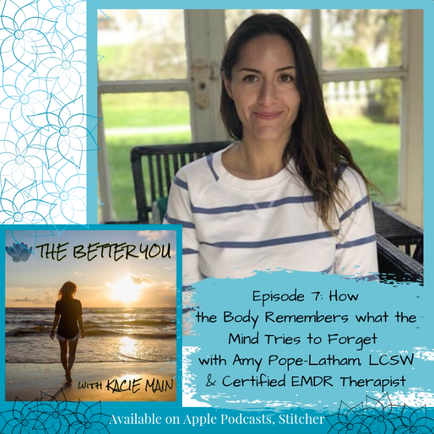 I am so excited to share the news of this freshly released podcast episode with you! I recently sat down for a conversation with Jacksonville local, Kacie Main, who is both the author of her book "I Gave Up Men for Lent" and host of "The Better You" podcast. Kacie beams with joy and she is clearly passionate about learning and inspiring others. During our conversation, Kacie (with permission of course) picked my brain about my most favorite topics in mental health, including EMDR therapy, the neurobiology of trauma, and mindfulness! Click here for the link to Episode 7 of my conversation with Kacie for Apple Click here for the link for Episode 7 of my conversation with Kacie for Stitcher 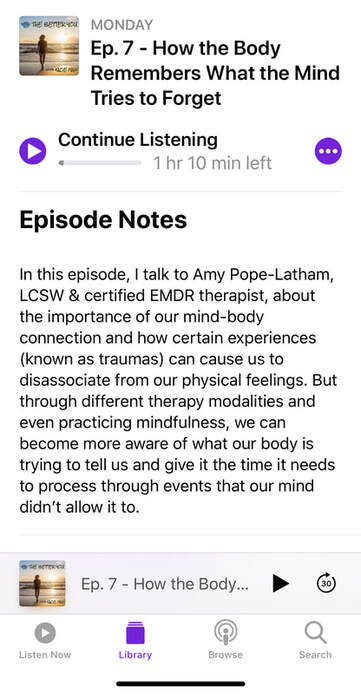 This community continues to surprise me in the most incredible ways and I am so thrilled to be here in Ponte Vedra Beach knowing people like Kacie are here shaping the world into a better place. I know I for sure look forward to hearing more from Kacie. Something leads me to believe she is on to something special with the work she is doing. If you have not done so yet, please give a follow to the incredible Kacie Main Instagram account @kaciemain_writes and of course, tune into and give a follow to the podcast @thebetteryoupodcast. Athletes face various challenges in their career on and off the sports field. I feel that a greater knowledge of the conceptualization of mindfulness and its impact on psychological skills could truly shift the way athletes maintain and even improve performance before, during, and after game time. In the unforgiving environment of professional sports, dysfunctional thinking can impact and interfere with performance.
When working with professional athletes, I love collaborating with my clients to develop specific strategies to address dysfunctional thinking patterns and other challenges. Coping strategies offer athletes additional psychological opportunities to enhance his or her chances of performing at his or her highest level under very demanding, stressful, and sometimes even hostile conditions. Before going any further in this blog post, I believe it is important to give credit to where credit it is due. Mindfulness is popular and used generously among mental health professionals as treatment for a variety of mental health disorders, including most notably, anxiety and trauma-related disorders. My two personal favorite types of Mindfulness interventions are Mindfulness Based- Cognitive Behavioral Therapy, and Dr. Jon Kabat-Zinn’s Mindfulness-Based Stress Reduction (MBSR). I was first introduced to Dr. Kabat-Zinn and MBSR in graduate school. Although I attended Stony Brook University, I was offered the opportunity to enroll in a research-based elective, dually offered by Columbia University and it's Advanced Consortium on "Evidence Based Practices", and in reflection, I am so happy I accepted the opportunity! High performance athletes can experience a variety of performance-inhibiting stressors. Most frequently, my clients come to session and process topics that induce stress such as: unrealistic expectations because of perfectionism, competition anxiety, anger and other negative emotions, fear of failure, perceived pressure, and avoidance behavior. Additionally, other factors that can negatively impact performance include: having an avoidant coping style, interpersonal problems, or life-balance difficulties. However, similar to the most successful surgeons, athletes have the distinct superpower to transform stressors automatically into fuel in order to meet the specific demands of the game. In other words, athletes use this automatic process, similar to autopilot as a way to use stress as energy, resulting in enhanced performance. Most frequently this superpower is an alternative label for more well-known defense mechanisms such as "compartmentalization" and "sublimation". So if athletes have metaphorical black belts in compartmentalizing and channeling emotional and psychological stress into elite performance fuel, why are we focusing on Mindfulness? Mindfulness focuses on changing the function, not the form of behavior, emotion, thinking, or how we experience things. Mindfulness aims to change the relationship of thoughts and emotions. Mindfulness has no desire to change the content of those thoughts and emotions. How can this be integrated into elite sports? Perhaps breathing exercises can be introduced in a non-sport setting. Athletes can integrate mindfulness exercises directly during a big play when they focus on the breath or letting go of thoughts of pain or discomfort. One of my favorite techniques is using a body scan exercise. Again, thinking of how this can be woven into the tapestry of sport, a body scan exercise can be easily completed during the cool-down at the end of practice or training. I don’t want to suggest that using mindfulness will automatically lead to major shifts in performance overnight. But down the road with further inclusion of mental health support in professional sports, I think we will start to see a happier and overall healthier group of professional athletes and role models. Your brain is not wired to make you happy. |
AuthorAmy Pope-Latham, LCSW is a board certified mental health professional in Ponte Vedra Beach, FL. Archives
December 2022
Categories
All
|


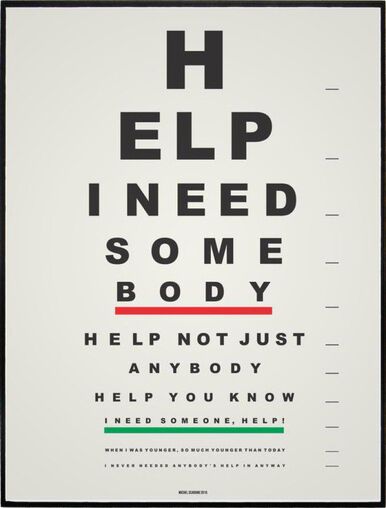

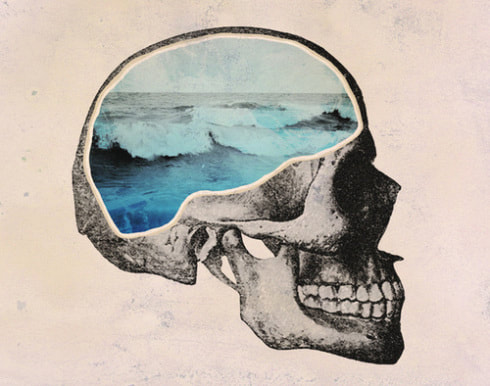
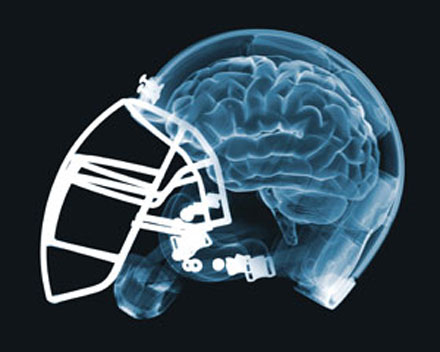
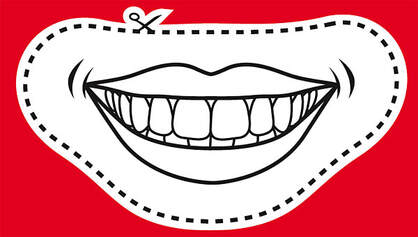
 RSS Feed
RSS Feed